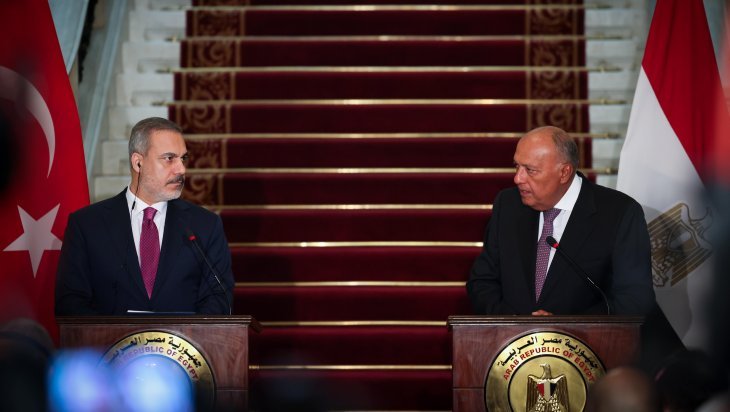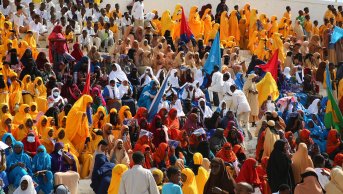North African Countries’ Approaches to the Israeli-Palestinian Conflict and Türkiye

The Gaza factions in Palestine launched an intense offensive on Saturday, October 7, in which dozens of fighters entered Israeli towns near the Gaza Strip. The Israeli army responded, and the clashes are still ongoing, with attacks by the Israeli Air Force, which has been observed to have very little concern for collateral damage, in these days when a comprehensive ground operation is expected. Hundreds of Israelis and Palestinians were killed, and thousands wounded in the clashes that followed the so-called Operation Al-Aqsa Flood. In addition, many Israeli soldiers and civilians were taken to Gaza by these groups.
There have been three major wars between Tel Aviv and the countries of the Middle East and North Africa since the establishment of Israel in the Palestinian territories in 1948. In recent years, the idea of a positive political environment has begun to prevail with attempts to normalize relations. However, the latest attack disrupted such an atmosphere. People living in North African countries, including Morocco and Sudan, which are normalizing relations with Israel, organized rallies in support of the Palestinians. This study examines the approaches of North African countries (Morocco, Algeria, Tunisia, Libya, Egypt, and Sudan) after the attack on Israel by Gaza groups and the possible steps towards the resolution of the conflict in which Türkiye seeks to participate.
Countries' Approach to Normalization: Algeria, Tunisia, and Libya
The tone of the statements made by the Algerian, Tunisian, and Libyan leaders after the attacks of the Gazan groups on Israel was quite harsh, and in this respect, they differed from the reactions of Morocco and Sudan in particular. These countries, which have historically supported the struggle of Palestinian groups against Israel, have maintained this foreign policy approach both in the eyes of the people and the administration in recent conflicts. As a matter of fact, all three countries opposed Israel's attempt to normalize its relations with Middle Eastern and North African countries within the framework of the Ibrahim Accords.
After the clashes were reported by the international media, Algeria called on the international community to intervene to protect the Palestinian people. In this context, the Algerian Ministry of Foreign Affairs stated that Algeria is following with great concern the "cruel" Israeli attacks on the Gaza Strip, which have claimed the lives of dozens of Palestinians, insisting on "the Zionist occupation's policy of oppression and cruelty" and the need to return to the 1967 borders with Jerusalem as its capital. Moreover, on October 11, President Erdogan and his counterpart, Abdel Majid Tebboune, held a telephone conversation and discussed mediation to resolve the conflict.
A statement issued by the Tunisian Presidency emphasized the right of the Palestinians to an independent state and called on Tunisia to stand with all "people of conscience" around the world as they remember the hundreds of massacres committed by the "Zionists" against the Palestinians. The statement also called on Israel to stop its "barbaric attacks". In Tunisia, which is also struggling with a domestic political and economic crisis, a rally in support of Palestine was organized and an atmosphere of unity emerged in the country despite political differences.
On the Libyan side, statements by Prime Minister Abdul Hamid Dbeibah, the Foreign Ministry, Mohamed Takala, President of the Supreme Council of State, and the Tobruk-based parliament highlighted a common political approach. In this context, the Prime Minister of the Government of National Unity (GNU), Dbeibah, emphasized the support of the Libyan people for the Palestinians and discussed with Palestinian President Mahmoud Abbas the delivery of humanitarian aid to the Gaza Strip and the provision of water, electricity, and basic food to the Palestinian people in Gaza. The Libyan Foreign Ministry pointed out in a written statement that Israel is responsible for the consequences of the Palestinian resistance response to the persecution of Palestinians, violations against the Al-Aqsa Mosque, and the construction of Jewish settlements. The Supreme Council of State (SCS), led by Mohamed Takala, described the attacks as the Palestinian people's right to self-defense and condemned the Israeli airstrikes on Gaza, which killed 250 people. The Tobruk-based parliament, on the other hand, declared its commitment to the Palestinian people and their struggle for freedom and called on all Arab nations to support the Palestinian cause. Moreover, the then MBH Foreign Minister Najla Mengoush was dismissed in recent months following public protests after it was revealed that she had held secret meetings with Israeli parties in Italy, and it is evident today that the Palestinian issue unites Libyan society despite all its differences.
Morocco and Sudan in the Normalization Process
Morocco and Sudan are the two North African countries that continued the normalization process by signing the Abraham Accords with Israel. The signing of these agreements by the governments in Rabat and Khartoum is a pragmatic foreign policy choice. The Kingdom of Morocco, which signed the agreement at the initiative of then - US President Donald Trump, aimed to consolidate its power in the international community by having its sovereignty over the Western Sahara recognized by Western actors, while Sudan's goal was to strengthen its relations with Western actors after the fall of Omar al-Bashir's administration in April 2019 and the full lifting of political and economic sanctions by the United States. While both countries have achieved their main objectives, there have been significant reactions and protests from their societies. Indeed, following the clashes between Gazan groups and Israel, the people of these countries organized rallies in support of Palestine and called on their governments to suspend the normalization process with Israel.
In this context, the Moroccan Foreign Ministry issued a statement expressing concern over the deepening conflict in the Gaza Strip and condemning the targeting of civilians, regardless of the side involved. However, one of Morocco's largest parliamentary parties characterized the actions of Gazan groups as "heroic" and "a legitimate response to daily violations". Thus, there is a significant difference between Morocco's public approach to Palestine and its leadership. The Sudanese Ministry of Foreign Affairs, on the other hand, pointed out that the violence was due to the decline in international attention to the Palestinian issue and reiterated Sudan's support for the legitimate rights of the Palestinian people to an independent state. It is therefore noteworthy that the statements by Morocco and Sudan were limited compared to other countries in the region.
Egypt's Position and Türkiye's role in Conflict Resolution
Egypt signed a peace treaty with Israel decades ago and has long acted as a mediator in the Israeli-Palestinian conflict. However, anti-Israeli sentiments have been on the rise in the country, especially during periods of violence. Indeed, following the clashes, Israeli tourists were killed by local police in Alexandria, Egypt. On the other hand, an Egyptian official stated that Israel has requested Cairo's help to ensure the safety of its abducted citizens and that the Egyptian intelligence chief has contacted Hamas and Islamic Jihad for information. According to the official, Palestinian leaders claimed that they did not yet have the "overall picture" of the hostages but said that those brought to Gaza were being taken to "safe places" throughout the region.
It is noteworthy that Egypt has taken diplomatic initiatives to de-escalate the intensity of the conflict between the parties and move towards a negotiation phase. In a statement released by the Presidency, it was emphasized that President Sisi is personally monitoring the developments in Gaza at the "Strategic Crisis Management Center". President Sisi instructed Foreign Minister Samih Shoukry to intensify contacts with regional countries and the conflicting parties in order to contain the situation and prevent further escalation of tensions between the parties. Sisi also held a telephone conversation with Turkish President Recep Tayyip Erdogan.
On the other hand, Turkish Foreign Minister Hakan Fidan visited Egypt on October 13-14, 2023. The normalization process in diplomatic relations between the two countries has been ongoing since 2021, and in July 2023, both countries mutually elevated their relations from Chargé d'Affaires to Ambassadors. In this context, one of the common priorities of Türkiye and Egypt in Middle East politics is the struggle for Palestinian rights. While the two countries do not compromise on the protection of Palestine's legitimate rights within the framework of international law, they also pursue a balanced policy with Israel.
Israel's ability to maintain a balance of power vis-à-vis the Palestinians and to impose its position on Palestine with the support of global powers is not accepted in most of the Islamic world, especially in Türkiye and Egypt. At the press conference after Fidan's meeting with his counterpart Shukri in Cairo, it was stated that the two countries are on the same page on the Palestinian issue, that the problem can be solved with the establishment of a Palestinian state, and that there is a common readiness to resolve the conflict, but that it is waiting for maturity for a clearer statement.
In this context, there are diplomatic tools through different global and regional organizations such as the Organization of Islamic Cooperation, of which Türkiye and Egypt are the most important members; the League of Arab States, of which Egypt is a decisive part; and the African Union (AU), through which the two actors can take the lead in resolving the conflict between Gazan groups and Israel. The statement issued after the meeting indicates that the first step for both actors is to convince the Israeli parties to open a humanitarian corridor to Gaza. As a secondary step, it may be possible to mediate for peace between the conflicting parties within the framework of decisions to be taken with the regional states through these organizations.
As a result, among the North African countries, Algeria, Tunisia, and Libya adopt a hardline stance compared to other actors; Morocco and Sudan, which are in the process of normalizing their relations with Israel, adopt a cautious approach; while Egypt, which has a land border with Gaza, continues to communicate with both global and regional actors and the parties to the conflict in order to provide humanitarian aid to Gaza, drawing attention to the need for the international community to take the initiative to stop the conflict and ensure peace in the region. Therefore, Egypt emphasizes the ways to resolve the conflict and is the main actor that can be active and effective in the mediation role in the coming period, which can be accepted by domestic political actors.








